Legal and Moral Construction of Crime: Criminology Assignment
VerifiedAdded on 2023/01/09
|7
|2172
|27
Homework Assignment
AI Summary
This assignment solution addresses key aspects of criminology, focusing on the legal and moral construction of crime and criminal behavior. It begins by exploring the importance of public morality in preserving lawfulness, examining how societal values and ethical standards influence the legal system and citizen behavior. The solution then delves into the role of judicial precedent within the criminal justice process, explaining its significance in maintaining consistency, fairness, and the development of law. It highlights the types of judicial precedent, their functions, and their impact on decision-making, including how precedent helps in time-saving and preventing errors. The solution makes references to relevant cases. Finally, the assignment provides a comprehensive understanding of the relationship between law, morality, and the judicial system.
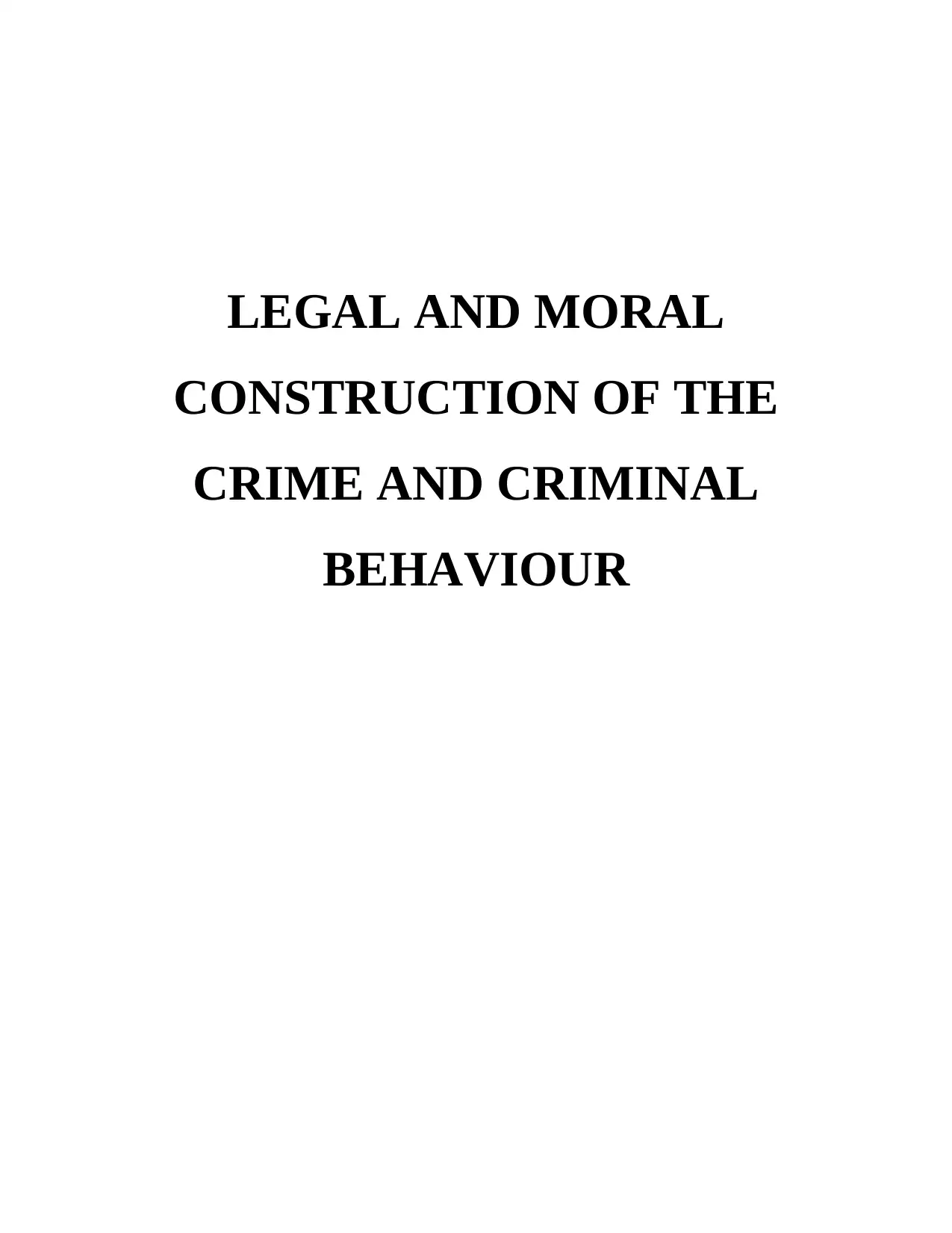
LEGAL AND MORAL
CONSTRUCTION OF THE
CRIME AND CRIMINAL
BEHAVIOUR
CONSTRUCTION OF THE
CRIME AND CRIMINAL
BEHAVIOUR
Paraphrase This Document
Need a fresh take? Get an instant paraphrase of this document with our AI Paraphraser
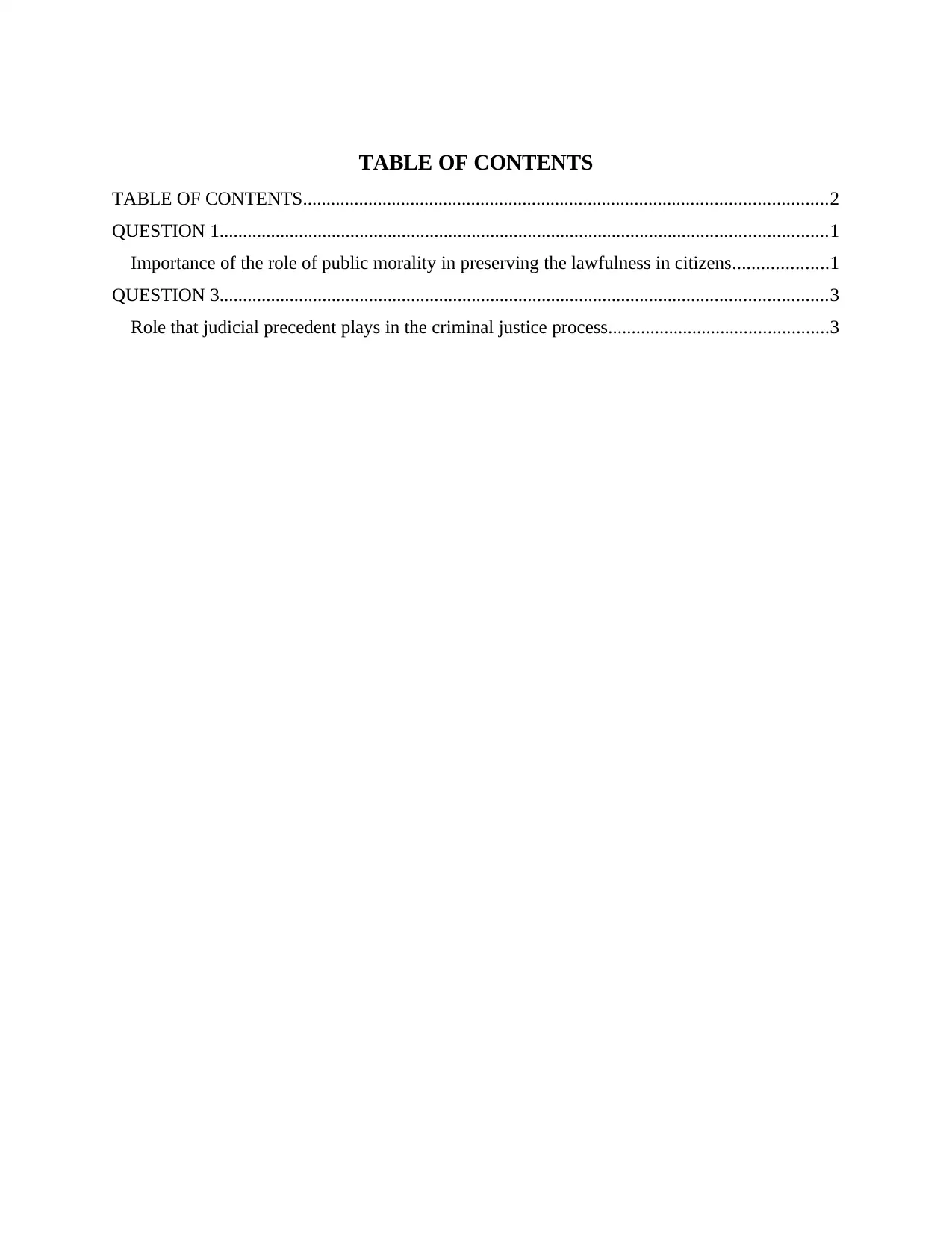
TABLE OF CONTENTS
TABLE OF CONTENTS................................................................................................................2
QUESTION 1..................................................................................................................................1
Importance of the role of public morality in preserving the lawfulness in citizens....................1
QUESTION 3..................................................................................................................................3
Role that judicial precedent plays in the criminal justice process...............................................3
TABLE OF CONTENTS................................................................................................................2
QUESTION 1..................................................................................................................................1
Importance of the role of public morality in preserving the lawfulness in citizens....................1
QUESTION 3..................................................................................................................................3
Role that judicial precedent plays in the criminal justice process...............................................3
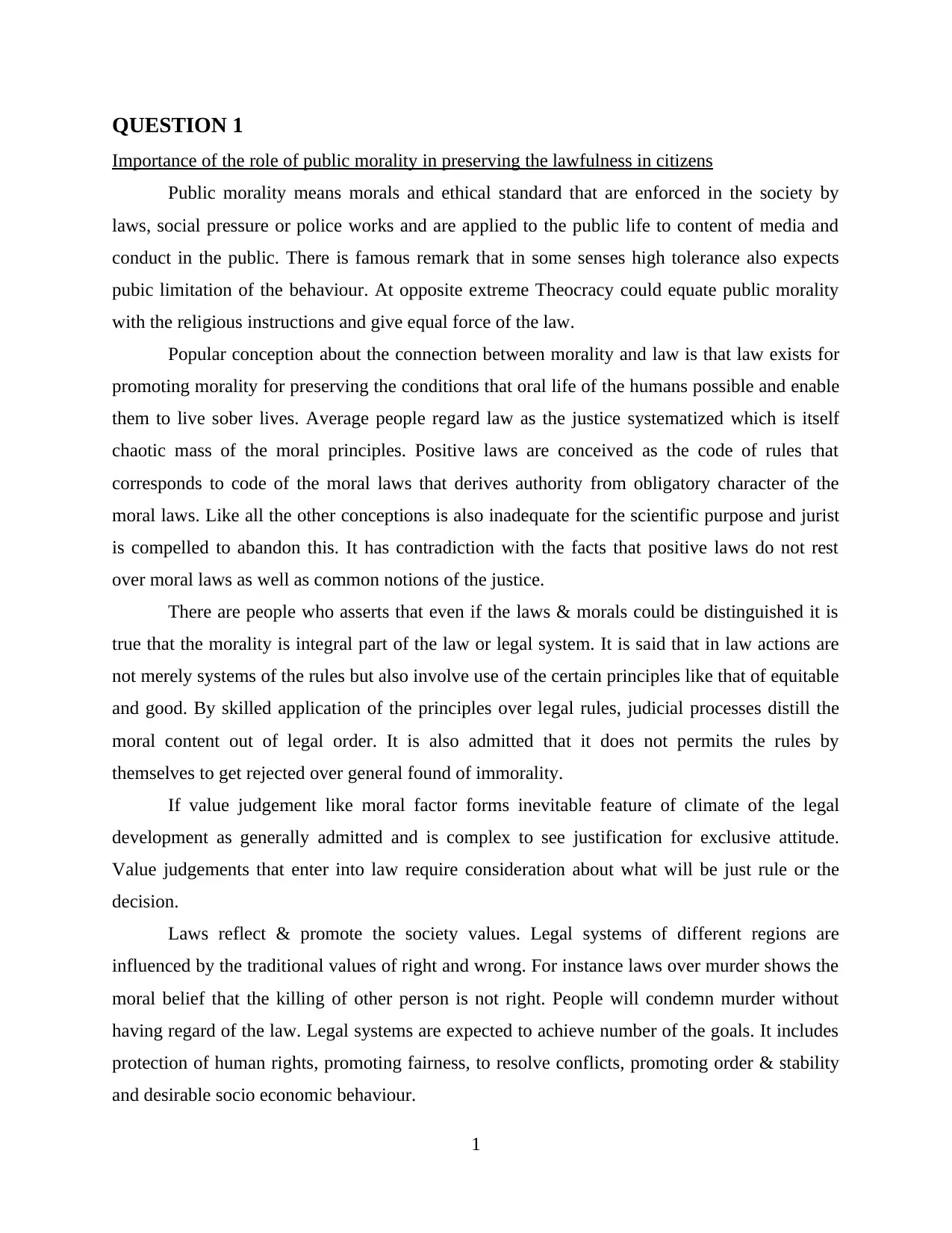
QUESTION 1
Importance of the role of public morality in preserving the lawfulness in citizens
Public morality means morals and ethical standard that are enforced in the society by
laws, social pressure or police works and are applied to the public life to content of media and
conduct in the public. There is famous remark that in some senses high tolerance also expects
pubic limitation of the behaviour. At opposite extreme Theocracy could equate public morality
with the religious instructions and give equal force of the law.
Popular conception about the connection between morality and law is that law exists for
promoting morality for preserving the conditions that oral life of the humans possible and enable
them to live sober lives. Average people regard law as the justice systematized which is itself
chaotic mass of the moral principles. Positive laws are conceived as the code of rules that
corresponds to code of the moral laws that derives authority from obligatory character of the
moral laws. Like all the other conceptions is also inadequate for the scientific purpose and jurist
is compelled to abandon this. It has contradiction with the facts that positive laws do not rest
over moral laws as well as common notions of the justice.
There are people who asserts that even if the laws & morals could be distinguished it is
true that the morality is integral part of the law or legal system. It is said that in law actions are
not merely systems of the rules but also involve use of the certain principles like that of equitable
and good. By skilled application of the principles over legal rules, judicial processes distill the
moral content out of legal order. It is also admitted that it does not permits the rules by
themselves to get rejected over general found of immorality.
If value judgement like moral factor forms inevitable feature of climate of the legal
development as generally admitted and is complex to see justification for exclusive attitude.
Value judgements that enter into law require consideration about what will be just rule or the
decision.
Laws reflect & promote the society values. Legal systems of different regions are
influenced by the traditional values of right and wrong. For instance laws over murder shows the
moral belief that the killing of other person is not right. People will condemn murder without
having regard of the law. Legal systems are expected to achieve number of the goals. It includes
protection of human rights, promoting fairness, to resolve conflicts, promoting order & stability
and desirable socio economic behaviour.
1
Importance of the role of public morality in preserving the lawfulness in citizens
Public morality means morals and ethical standard that are enforced in the society by
laws, social pressure or police works and are applied to the public life to content of media and
conduct in the public. There is famous remark that in some senses high tolerance also expects
pubic limitation of the behaviour. At opposite extreme Theocracy could equate public morality
with the religious instructions and give equal force of the law.
Popular conception about the connection between morality and law is that law exists for
promoting morality for preserving the conditions that oral life of the humans possible and enable
them to live sober lives. Average people regard law as the justice systematized which is itself
chaotic mass of the moral principles. Positive laws are conceived as the code of rules that
corresponds to code of the moral laws that derives authority from obligatory character of the
moral laws. Like all the other conceptions is also inadequate for the scientific purpose and jurist
is compelled to abandon this. It has contradiction with the facts that positive laws do not rest
over moral laws as well as common notions of the justice.
There are people who asserts that even if the laws & morals could be distinguished it is
true that the morality is integral part of the law or legal system. It is said that in law actions are
not merely systems of the rules but also involve use of the certain principles like that of equitable
and good. By skilled application of the principles over legal rules, judicial processes distill the
moral content out of legal order. It is also admitted that it does not permits the rules by
themselves to get rejected over general found of immorality.
If value judgement like moral factor forms inevitable feature of climate of the legal
development as generally admitted and is complex to see justification for exclusive attitude.
Value judgements that enter into law require consideration about what will be just rule or the
decision.
Laws reflect & promote the society values. Legal systems of different regions are
influenced by the traditional values of right and wrong. For instance laws over murder shows the
moral belief that the killing of other person is not right. People will condemn murder without
having regard of the law. Legal systems are expected to achieve number of the goals. It includes
protection of human rights, promoting fairness, to resolve conflicts, promoting order & stability
and desirable socio economic behaviour.
1
⊘ This is a preview!⊘
Do you want full access?
Subscribe today to unlock all pages.

Trusted by 1+ million students worldwide
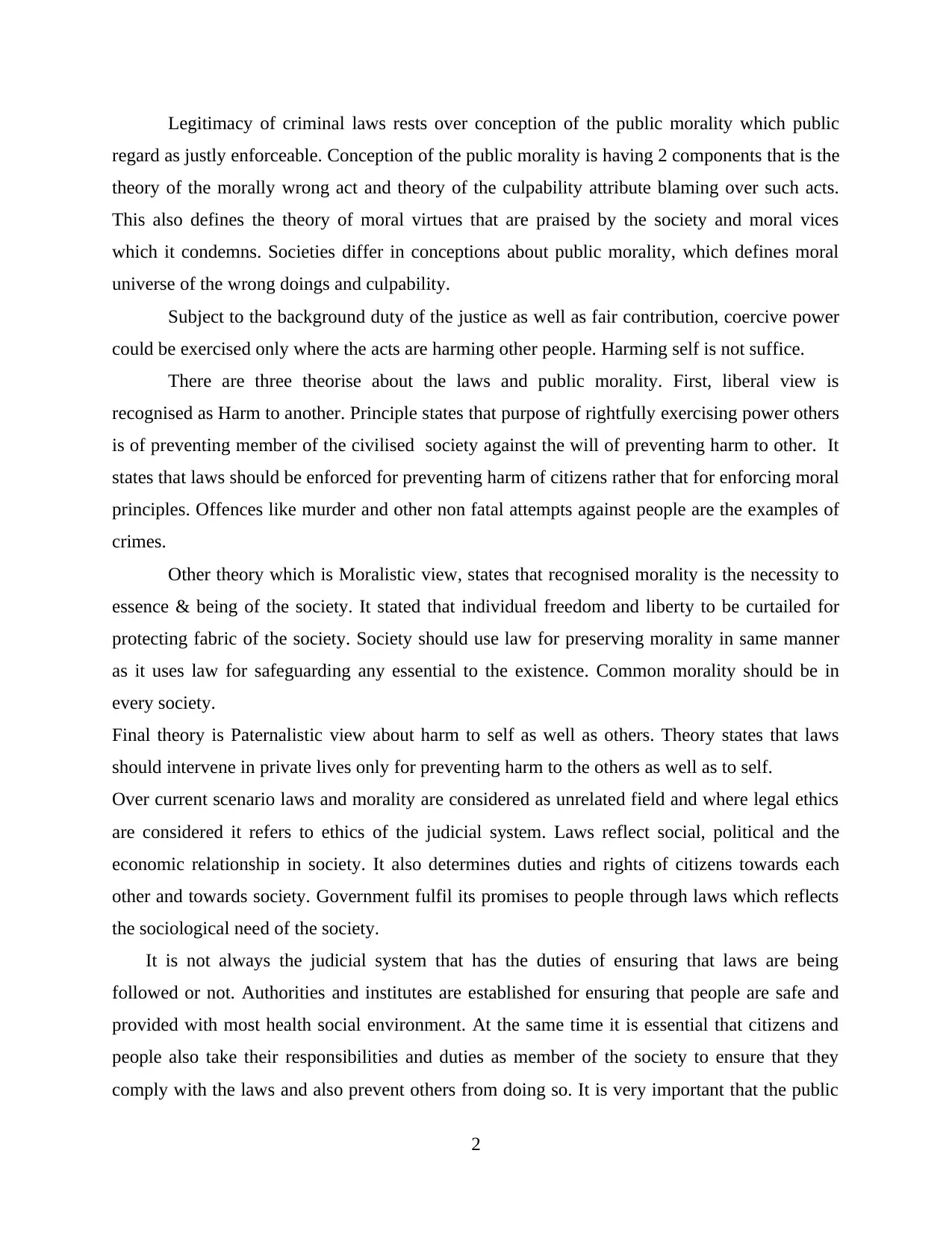
Legitimacy of criminal laws rests over conception of the public morality which public
regard as justly enforceable. Conception of the public morality is having 2 components that is the
theory of the morally wrong act and theory of the culpability attribute blaming over such acts.
This also defines the theory of moral virtues that are praised by the society and moral vices
which it condemns. Societies differ in conceptions about public morality, which defines moral
universe of the wrong doings and culpability.
Subject to the background duty of the justice as well as fair contribution, coercive power
could be exercised only where the acts are harming other people. Harming self is not suffice.
There are three theorise about the laws and public morality. First, liberal view is
recognised as Harm to another. Principle states that purpose of rightfully exercising power others
is of preventing member of the civilised society against the will of preventing harm to other. It
states that laws should be enforced for preventing harm of citizens rather that for enforcing moral
principles. Offences like murder and other non fatal attempts against people are the examples of
crimes.
Other theory which is Moralistic view, states that recognised morality is the necessity to
essence & being of the society. It stated that individual freedom and liberty to be curtailed for
protecting fabric of the society. Society should use law for preserving morality in same manner
as it uses law for safeguarding any essential to the existence. Common morality should be in
every society.
Final theory is Paternalistic view about harm to self as well as others. Theory states that laws
should intervene in private lives only for preventing harm to the others as well as to self.
Over current scenario laws and morality are considered as unrelated field and where legal ethics
are considered it refers to ethics of the judicial system. Laws reflect social, political and the
economic relationship in society. It also determines duties and rights of citizens towards each
other and towards society. Government fulfil its promises to people through laws which reflects
the sociological need of the society.
It is not always the judicial system that has the duties of ensuring that laws are being
followed or not. Authorities and institutes are established for ensuring that people are safe and
provided with most health social environment. At the same time it is essential that citizens and
people also take their responsibilities and duties as member of the society to ensure that they
comply with the laws and also prevent others from doing so. It is very important that the public
2
regard as justly enforceable. Conception of the public morality is having 2 components that is the
theory of the morally wrong act and theory of the culpability attribute blaming over such acts.
This also defines the theory of moral virtues that are praised by the society and moral vices
which it condemns. Societies differ in conceptions about public morality, which defines moral
universe of the wrong doings and culpability.
Subject to the background duty of the justice as well as fair contribution, coercive power
could be exercised only where the acts are harming other people. Harming self is not suffice.
There are three theorise about the laws and public morality. First, liberal view is
recognised as Harm to another. Principle states that purpose of rightfully exercising power others
is of preventing member of the civilised society against the will of preventing harm to other. It
states that laws should be enforced for preventing harm of citizens rather that for enforcing moral
principles. Offences like murder and other non fatal attempts against people are the examples of
crimes.
Other theory which is Moralistic view, states that recognised morality is the necessity to
essence & being of the society. It stated that individual freedom and liberty to be curtailed for
protecting fabric of the society. Society should use law for preserving morality in same manner
as it uses law for safeguarding any essential to the existence. Common morality should be in
every society.
Final theory is Paternalistic view about harm to self as well as others. Theory states that laws
should intervene in private lives only for preventing harm to the others as well as to self.
Over current scenario laws and morality are considered as unrelated field and where legal ethics
are considered it refers to ethics of the judicial system. Laws reflect social, political and the
economic relationship in society. It also determines duties and rights of citizens towards each
other and towards society. Government fulfil its promises to people through laws which reflects
the sociological need of the society.
It is not always the judicial system that has the duties of ensuring that laws are being
followed or not. Authorities and institutes are established for ensuring that people are safe and
provided with most health social environment. At the same time it is essential that citizens and
people also take their responsibilities and duties as member of the society to ensure that they
comply with the laws and also prevent others from doing so. It is very important that the public
2
Paraphrase This Document
Need a fresh take? Get an instant paraphrase of this document with our AI Paraphraser
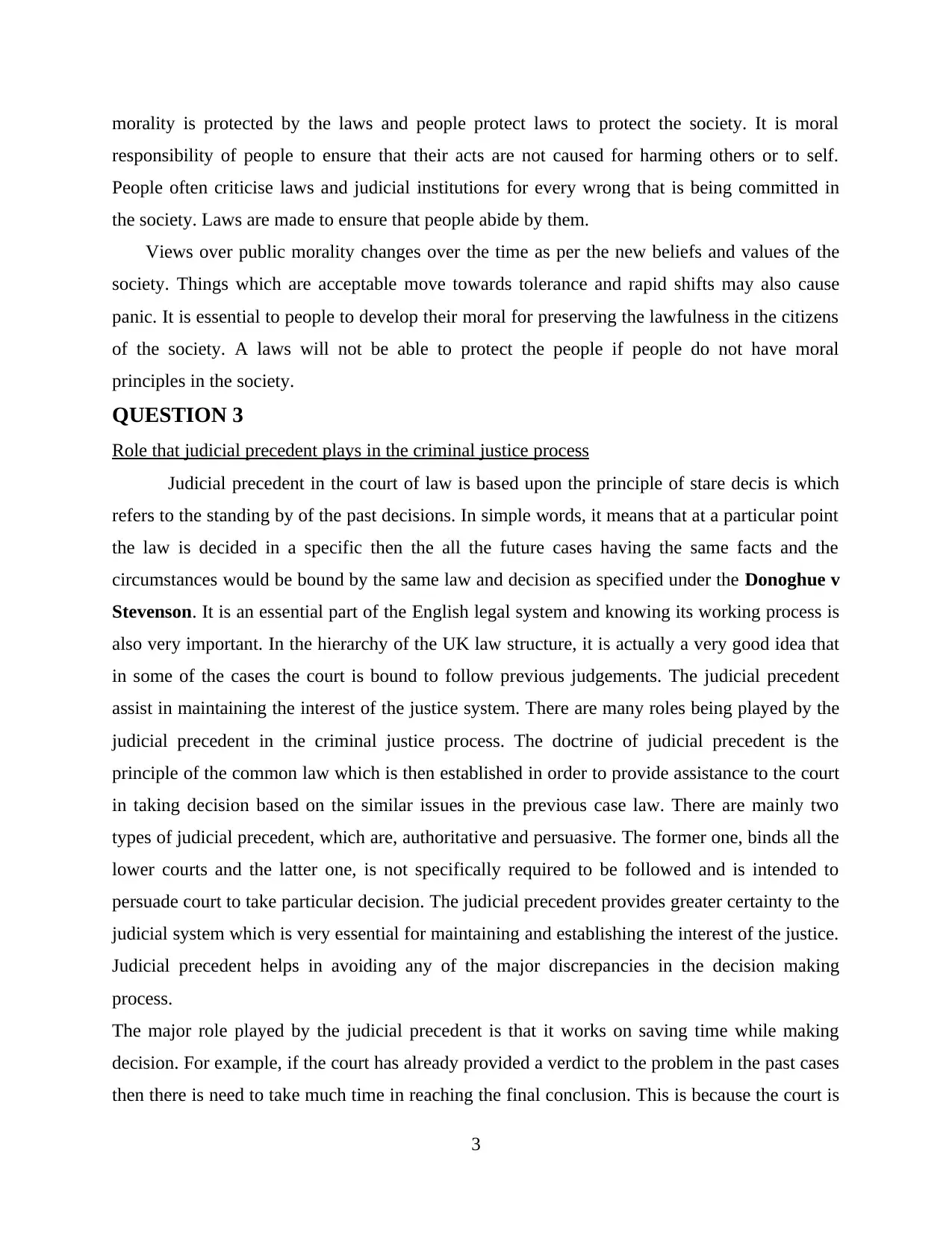
morality is protected by the laws and people protect laws to protect the society. It is moral
responsibility of people to ensure that their acts are not caused for harming others or to self.
People often criticise laws and judicial institutions for every wrong that is being committed in
the society. Laws are made to ensure that people abide by them.
Views over public morality changes over the time as per the new beliefs and values of the
society. Things which are acceptable move towards tolerance and rapid shifts may also cause
panic. It is essential to people to develop their moral for preserving the lawfulness in the citizens
of the society. A laws will not be able to protect the people if people do not have moral
principles in the society.
QUESTION 3
Role that judicial precedent plays in the criminal justice process
Judicial precedent in the court of law is based upon the principle of stare decis is which
refers to the standing by of the past decisions. In simple words, it means that at a particular point
the law is decided in a specific then the all the future cases having the same facts and the
circumstances would be bound by the same law and decision as specified under the Donoghue v
Stevenson. It is an essential part of the English legal system and knowing its working process is
also very important. In the hierarchy of the UK law structure, it is actually a very good idea that
in some of the cases the court is bound to follow previous judgements. The judicial precedent
assist in maintaining the interest of the justice system. There are many roles being played by the
judicial precedent in the criminal justice process. The doctrine of judicial precedent is the
principle of the common law which is then established in order to provide assistance to the court
in taking decision based on the similar issues in the previous case law. There are mainly two
types of judicial precedent, which are, authoritative and persuasive. The former one, binds all the
lower courts and the latter one, is not specifically required to be followed and is intended to
persuade court to take particular decision. The judicial precedent provides greater certainty to the
judicial system which is very essential for maintaining and establishing the interest of the justice.
Judicial precedent helps in avoiding any of the major discrepancies in the decision making
process.
The major role played by the judicial precedent is that it works on saving time while making
decision. For example, if the court has already provided a verdict to the problem in the past cases
then there is need to take much time in reaching the final conclusion. This is because the court is
3
responsibility of people to ensure that their acts are not caused for harming others or to self.
People often criticise laws and judicial institutions for every wrong that is being committed in
the society. Laws are made to ensure that people abide by them.
Views over public morality changes over the time as per the new beliefs and values of the
society. Things which are acceptable move towards tolerance and rapid shifts may also cause
panic. It is essential to people to develop their moral for preserving the lawfulness in the citizens
of the society. A laws will not be able to protect the people if people do not have moral
principles in the society.
QUESTION 3
Role that judicial precedent plays in the criminal justice process
Judicial precedent in the court of law is based upon the principle of stare decis is which
refers to the standing by of the past decisions. In simple words, it means that at a particular point
the law is decided in a specific then the all the future cases having the same facts and the
circumstances would be bound by the same law and decision as specified under the Donoghue v
Stevenson. It is an essential part of the English legal system and knowing its working process is
also very important. In the hierarchy of the UK law structure, it is actually a very good idea that
in some of the cases the court is bound to follow previous judgements. The judicial precedent
assist in maintaining the interest of the justice system. There are many roles being played by the
judicial precedent in the criminal justice process. The doctrine of judicial precedent is the
principle of the common law which is then established in order to provide assistance to the court
in taking decision based on the similar issues in the previous case law. There are mainly two
types of judicial precedent, which are, authoritative and persuasive. The former one, binds all the
lower courts and the latter one, is not specifically required to be followed and is intended to
persuade court to take particular decision. The judicial precedent provides greater certainty to the
judicial system which is very essential for maintaining and establishing the interest of the justice.
Judicial precedent helps in avoiding any of the major discrepancies in the decision making
process.
The major role played by the judicial precedent is that it works on saving time while making
decision. For example, if the court has already provided a verdict to the problem in the past cases
then there is need to take much time in reaching the final conclusion. This is because the court is
3
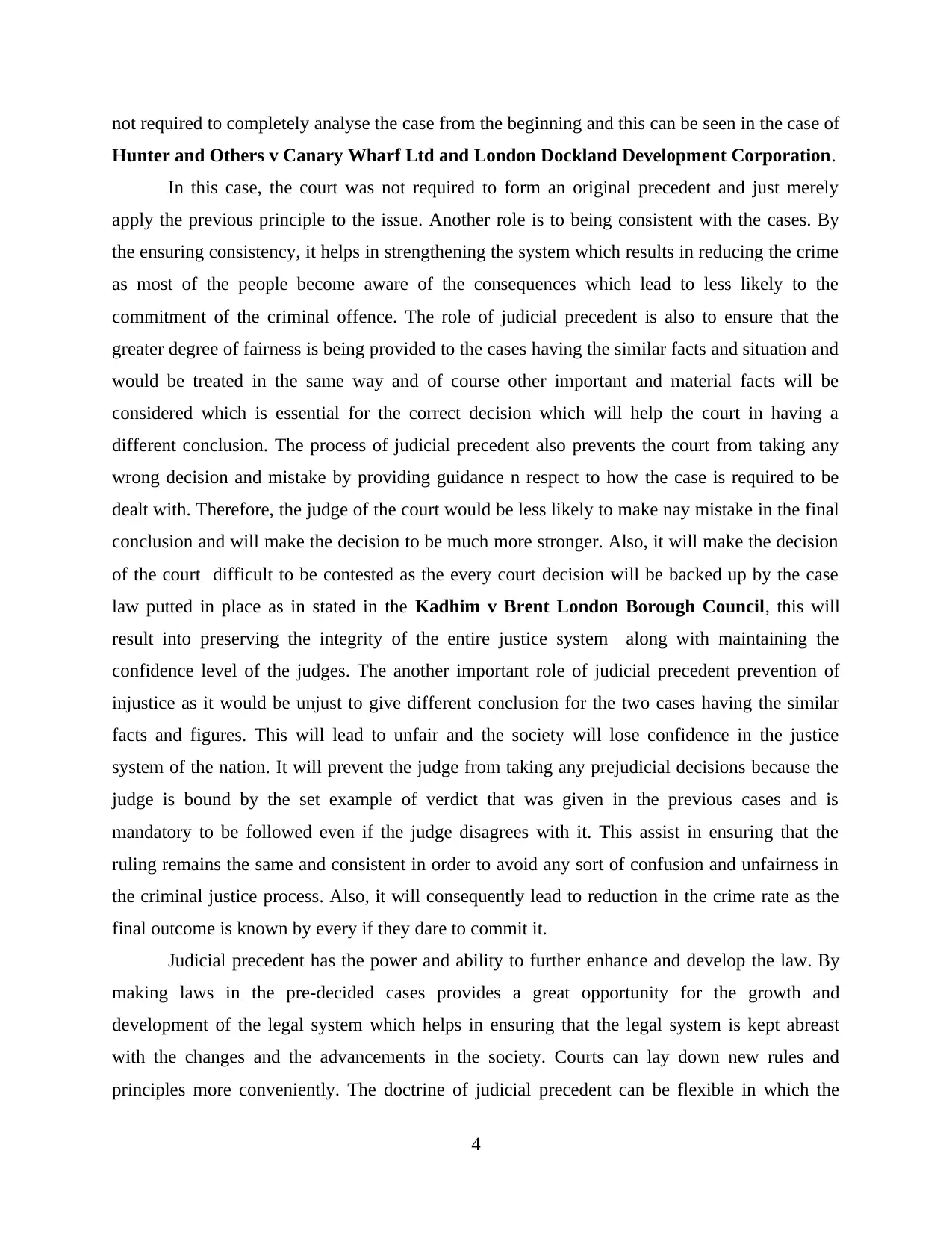
not required to completely analyse the case from the beginning and this can be seen in the case of
Hunter and Others v Canary Wharf Ltd and London Dockland Development Corporation.
In this case, the court was not required to form an original precedent and just merely
apply the previous principle to the issue. Another role is to being consistent with the cases. By
the ensuring consistency, it helps in strengthening the system which results in reducing the crime
as most of the people become aware of the consequences which lead to less likely to the
commitment of the criminal offence. The role of judicial precedent is also to ensure that the
greater degree of fairness is being provided to the cases having the similar facts and situation and
would be treated in the same way and of course other important and material facts will be
considered which is essential for the correct decision which will help the court in having a
different conclusion. The process of judicial precedent also prevents the court from taking any
wrong decision and mistake by providing guidance n respect to how the case is required to be
dealt with. Therefore, the judge of the court would be less likely to make nay mistake in the final
conclusion and will make the decision to be much more stronger. Also, it will make the decision
of the court difficult to be contested as the every court decision will be backed up by the case
law putted in place as in stated in the Kadhim v Brent London Borough Council, this will
result into preserving the integrity of the entire justice system along with maintaining the
confidence level of the judges. The another important role of judicial precedent prevention of
injustice as it would be unjust to give different conclusion for the two cases having the similar
facts and figures. This will lead to unfair and the society will lose confidence in the justice
system of the nation. It will prevent the judge from taking any prejudicial decisions because the
judge is bound by the set example of verdict that was given in the previous cases and is
mandatory to be followed even if the judge disagrees with it. This assist in ensuring that the
ruling remains the same and consistent in order to avoid any sort of confusion and unfairness in
the criminal justice process. Also, it will consequently lead to reduction in the crime rate as the
final outcome is known by every if they dare to commit it.
Judicial precedent has the power and ability to further enhance and develop the law. By
making laws in the pre-decided cases provides a great opportunity for the growth and
development of the legal system which helps in ensuring that the legal system is kept abreast
with the changes and the advancements in the society. Courts can lay down new rules and
principles more conveniently. The doctrine of judicial precedent can be flexible in which the
4
Hunter and Others v Canary Wharf Ltd and London Dockland Development Corporation.
In this case, the court was not required to form an original precedent and just merely
apply the previous principle to the issue. Another role is to being consistent with the cases. By
the ensuring consistency, it helps in strengthening the system which results in reducing the crime
as most of the people become aware of the consequences which lead to less likely to the
commitment of the criminal offence. The role of judicial precedent is also to ensure that the
greater degree of fairness is being provided to the cases having the similar facts and situation and
would be treated in the same way and of course other important and material facts will be
considered which is essential for the correct decision which will help the court in having a
different conclusion. The process of judicial precedent also prevents the court from taking any
wrong decision and mistake by providing guidance n respect to how the case is required to be
dealt with. Therefore, the judge of the court would be less likely to make nay mistake in the final
conclusion and will make the decision to be much more stronger. Also, it will make the decision
of the court difficult to be contested as the every court decision will be backed up by the case
law putted in place as in stated in the Kadhim v Brent London Borough Council, this will
result into preserving the integrity of the entire justice system along with maintaining the
confidence level of the judges. The another important role of judicial precedent prevention of
injustice as it would be unjust to give different conclusion for the two cases having the similar
facts and figures. This will lead to unfair and the society will lose confidence in the justice
system of the nation. It will prevent the judge from taking any prejudicial decisions because the
judge is bound by the set example of verdict that was given in the previous cases and is
mandatory to be followed even if the judge disagrees with it. This assist in ensuring that the
ruling remains the same and consistent in order to avoid any sort of confusion and unfairness in
the criminal justice process. Also, it will consequently lead to reduction in the crime rate as the
final outcome is known by every if they dare to commit it.
Judicial precedent has the power and ability to further enhance and develop the law. By
making laws in the pre-decided cases provides a great opportunity for the growth and
development of the legal system which helps in ensuring that the legal system is kept abreast
with the changes and the advancements in the society. Courts can lay down new rules and
principles more conveniently. The doctrine of judicial precedent can be flexible in which the
4
⊘ This is a preview!⊘
Do you want full access?
Subscribe today to unlock all pages.

Trusted by 1+ million students worldwide
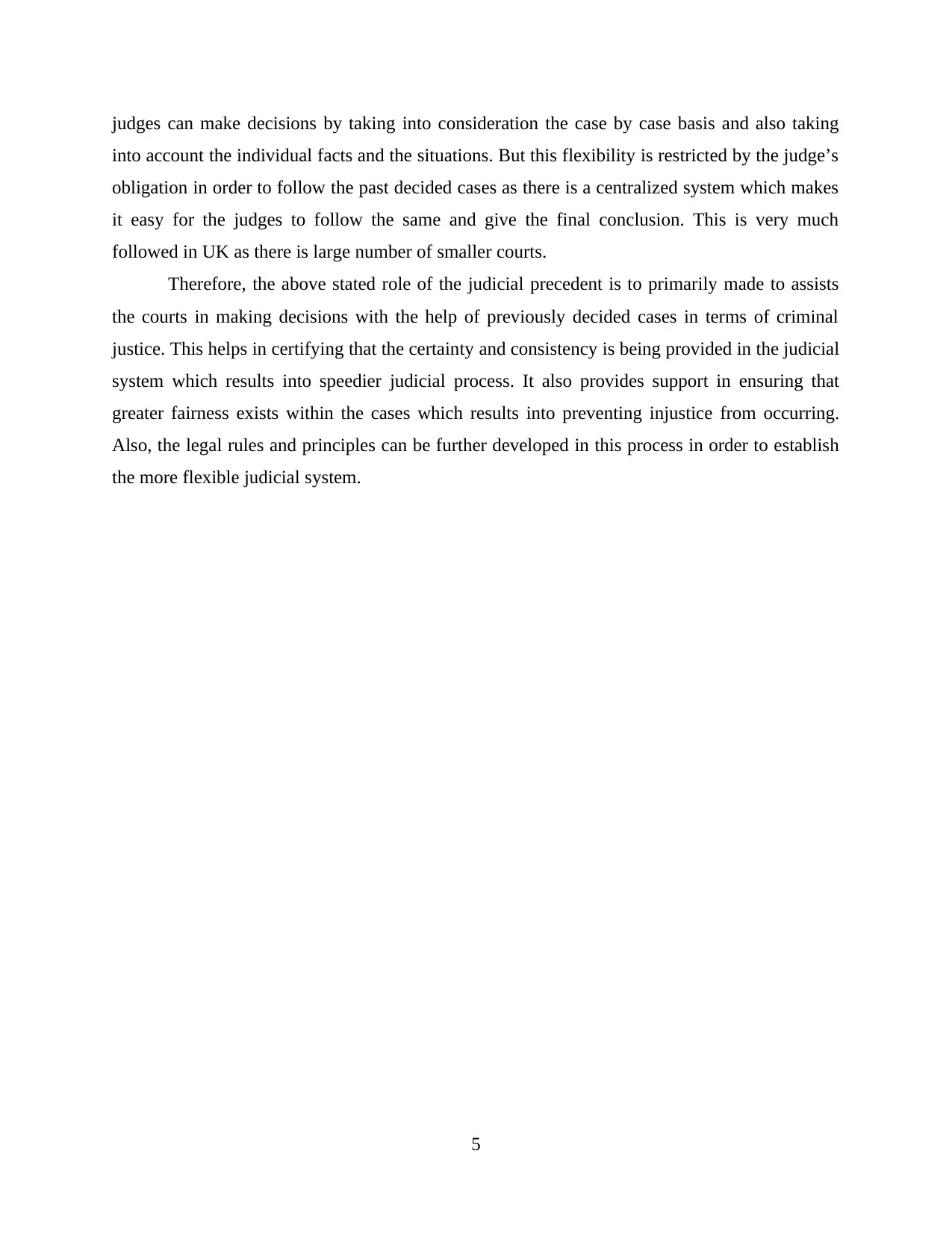
judges can make decisions by taking into consideration the case by case basis and also taking
into account the individual facts and the situations. But this flexibility is restricted by the judge’s
obligation in order to follow the past decided cases as there is a centralized system which makes
it easy for the judges to follow the same and give the final conclusion. This is very much
followed in UK as there is large number of smaller courts.
Therefore, the above stated role of the judicial precedent is to primarily made to assists
the courts in making decisions with the help of previously decided cases in terms of criminal
justice. This helps in certifying that the certainty and consistency is being provided in the judicial
system which results into speedier judicial process. It also provides support in ensuring that
greater fairness exists within the cases which results into preventing injustice from occurring.
Also, the legal rules and principles can be further developed in this process in order to establish
the more flexible judicial system.
5
into account the individual facts and the situations. But this flexibility is restricted by the judge’s
obligation in order to follow the past decided cases as there is a centralized system which makes
it easy for the judges to follow the same and give the final conclusion. This is very much
followed in UK as there is large number of smaller courts.
Therefore, the above stated role of the judicial precedent is to primarily made to assists
the courts in making decisions with the help of previously decided cases in terms of criminal
justice. This helps in certifying that the certainty and consistency is being provided in the judicial
system which results into speedier judicial process. It also provides support in ensuring that
greater fairness exists within the cases which results into preventing injustice from occurring.
Also, the legal rules and principles can be further developed in this process in order to establish
the more flexible judicial system.
5
1 out of 7
Related Documents
Your All-in-One AI-Powered Toolkit for Academic Success.
+13062052269
info@desklib.com
Available 24*7 on WhatsApp / Email
![[object Object]](/_next/static/media/star-bottom.7253800d.svg)
Unlock your academic potential
Copyright © 2020–2026 A2Z Services. All Rights Reserved. Developed and managed by ZUCOL.





